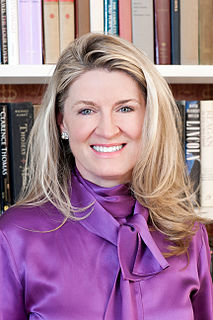A Quote by Margaret Sanger
The third group [of society] are those irresponsible and reckless ones having little regard for the consequences of their acts, or whose religious scruples prevent their exercising control over their numbers. Many of this group are diseased, feeble-minded, and are of the pauper element dependent upon the normal and fit members of society for their support. There is no doubt in the minds of all thinking people that the procreation of this group should be stopped.
Quote Topics
Related Quotes
Any group or "collective," large or small, is only a number of individuals. A group can have no rights other than the rights of its individual members. In a free society, the "rights" of any group are derived from the rights of its members through their voluntary individual choice and contractual agreement, and are merely the application of these individual rights to a specific undertaking... A group, as such, has no rights.
Society is not a mere sum of individuals. Rather, the system formed by their association represents a specific reality which has its own characteristics... The group thinks, feels, and acts quite differently from the way in which its members would were they isolated. If, then, we begin with the individual, we shall be able to understand nothing of what takes place in the group.
When the Jews were being persecuted by the Nazis in 1944 we passed the War Refugee Act, which focused on rescuing Jews, a religious group. But if the religious group is the subject of the persecution based on their religion, it's perfectly OK for a First Amendment-bound society to emphasize their rescue, just as it is perfectly OK to emphasize the fact that many, if not all of the perpetrators of Islamic terrorism, come from countries with a history of supporting terrorism.
Groups are only smart when there is a balance between the information that everyone in the group shares and the information that each of the members of the group holds privately. It's the combination of all those pieces of independent information, some of them right, some of the wrong, that keeps the group wise.
Safety lies in catering to the in-group. We are not all brave. All I would ask of writers who find it hard to question the universal validity of their personal opinions and affiliations is that they consider this: Every group we belong to - by gender, sex, race, religion, age - is an in-group, surrounded by an immense out-group, living next door and all over the world, who will be alive as far into the future as humanity has a future. That out-group is called other people. It is for them that we write.
Psychologists usually offer three explanations for the failure of group brainstorming. The first is social loafing: in a group, some individuals tend to sit back and let others do the work. The second is production blocking: only one person can talk or produce an idea at once, while the other group members are forced to sit passively. And the third is evaluation apprehension, meaning the fear of looking stupid in front of one's peers.
Individual versus group selection results in a mix of altruism and selfishness, of virtue and sin, among the members of a society. If one colony member devotes its life to service over marriage, the individual is of benefit to the society, even though it does not have personal offspring. A soldier going into battle will benefit his country, but he runs a higher risk of death than one who does not. An altruist benefits the group, but a layabout or coward who saves his own energy and reduces his bodily risk passes the resulting social cost to others.
Society is the body; individuals are its members, its limbs. Just as the various limbs help and co-operate with one another and thus are happy, so each must unite with others in being helpful to all in thought, speech and action... One may see to the good of one's own group, i.e., the group that is immediate to him, and then proceed to others.





































